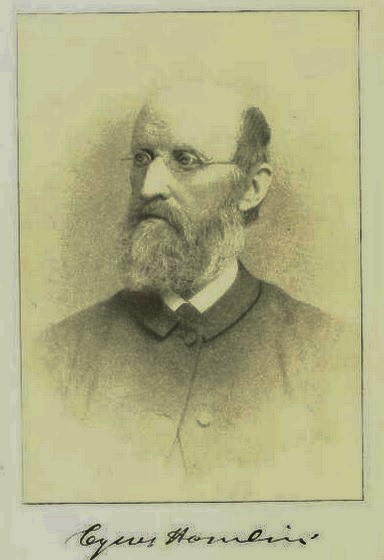by Nathaniel Roy

Cyrus Hamlin was perhaps the most famous American missionary serving abroad during the Crimean War. He was a man of high esteem in the late 1800s. His life was all about new beginnings and positive changes. He tells his story in his autobiography titled My Life and Times; this book details his life from his wayward beginning to his adult life later on. Without this book, little would be known of this man, and his stories would all be forgotten in a matter of time. However, because he wrote this book, his legacy can be passed on, and his life can be shared for years to come.
Best known for his presidency of Middlebury College, Hamlin played a notable role in the Crimean War by serving as a breadmaker and missionary. His role in the Crimean War can be seen as a small one as compared with rank and file military men, diplomats, or heads of state. Yet his seminary bread helped hundreds of patients in the hospitals and soldiers alike. Not only did the bread he baked with seminarians in Bebek Seminary help the soldiers, but his account also shows just how corrupt the military was. This corruption was not present in every hospital; in fact, Hamlin sent bread to another hospital during this period as well. It can give an explanation, at least, to why the hospitals were so unsanitary and comparable to death traps during this period. Some surgeons and staff prioritized private gain over aiding patients.
Cyrus Hamlin lived and worked in the Ottoman Empire at a time of critical change. He spent his life in the Ottoman Empire on Christian outreach and conversion and the legacy of Cyrus Hamlin’s bakery was long lasting. After the war was over, there was no need for so much bread and food. Yet, his teachings and influence persisted through the Ottoman Empire. Most directly, it prompted him to found Robert College and become its president.[1] Some in the Turkish government thought that Hamlin should be suppressed, but the grand vizier granted permission because Hamlin already ran Bebek Seminary for 20 years.[2]
It is possible that his seminary helped inspire some movements toward religious toleration in the Ottoman Empire. During the Crimean War, not only were the Ottomans fighting a war, but they were also working hard to control their populations. With their growing political economy and government, there was unrest in the population of their empire. One of the bigger problems that persisted was an idea of changing the people from subjects to citizens.[3] To do this, the Ottoman Empire produced reforms called the Tanzimat. These reforms were supposed to help the population and provide more unity within the empire.[4] From these reforms, Christians in the Ottoman Empire now had more power than ever before, and they were almost equal to their Muslim counterparts.[5]
Another impact that Hamlin’s seminary and college had on the Ottoman Empire was the introduction and infusion of western culture. Hamlin brought with him western ideologies and teachings which he passed on to the Christians in the Ottoman Empire. The spread of western ideologies and culture has been a widespread effort and a long-lasting theme in all of history. Whether Hamlin understood he was doing this or not, he was implicity spreading western culture. One can now see that Hamlin was around during times of great change even though he might not have realized it at the time.
Notes
[1] Hamlin, My Life and Times, 435.
[2] Hamlin, My Life and Times, 435.
[3] Wajih Kawtharani, “The Ottoman Tanzimat and the Constitution,” AlMuntaqa 1, no. 1 (2018): 52.
[4] Kawtharani, “The Ottoman Tanzimat and the Constitution,” 52.
[5] Kawtharani, “The Ottoman Tanzimat and the Constitution,” 51.